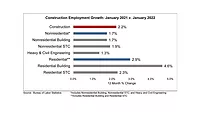FirstService Execs Report Solid Second Quarter Despite Tough Comparison
Effects of Texas freeze still felt a year later.

Photo credit: JaysonPhotography / iStock / Getty Images Plus via Getty Images
FirstService Corp, the parent company of Paul Davis and First Onsite, recently reported its second-quarter results and shared an insight into how the overall restoration market is performing.
Overall, the company revenue from its restoration services declined in the second quarter. However, that was a very tough comparison due to one very large weather event — the Great Texas Freeze of 2021. Adjusted organic growth for FirstService’s restoration business grew by 10% in the quarter.
“We are pleased with the way the second quarter worked out for us, especially our organic growth,” said FirstService CEO Scott Patterson.
The mild weather seen in many parts of the country in the first half of the years means fewer big-ticket jobs for Paul Davis and First Onsite. Usually, the third-quarter provides the most weather-related work. This is especially true as the Atlantic hurricane season gets into full swing.
NOAA recently released its mid-season update for hurricane forecasts. The agency’s forecasters have slightly decreased the likelihood of an above-normal Atlantic hurricane season to 60% (lowered from the May outlook, which predicted a 65% chance). The likelihood of near-normal activity has risen to 30% and the chances remain at 10% for a below-normal season.
The increased business from last year’s extreme weather event still provides a long-term financial boost to the company, said Jeremy Rakusin, FirstService’s chief financial officer.
“That event generated both high-margin mitigation jobs and an incremental $50 million in revenue that drove operating leverage,” Rakusin said.
FirstService executives used that extra income to invest in the company, including 10 acquisitions. Patterson said he plans for more growth, including more acquisitions, with the goal of becoming a $2 billion company. Rakusin said executives are in discussions with several candidates for purchase.
While FirstService has yet to make a deal this year, the company has the cash and financing available to move when the right situation arises, Rakusin said. Competition for acquisitions remains robust, Patterson said, including from private equity firms.
The environment remains positive for mergers and acquisitions even after recent rate hikes from the Federal Reserve. Financing remains relatively inexpensive and many ageing business owners continue to seek a way to get out of their companies.
Rakusin said a goal of future acquisitions is to improve the company’s ability to win more national accounts. That's a goal for most acquiring companies. A pair of recent examples of larger restoration companies buying family-owned firms to expand their reach are ATI Restoration LLC buying All County Remediation and BluSky Restoration Contractors LLC merging with Pro-Care Disaster Restoration Services.
A challenge in making more acquisitions is that sellers set their prices based on 2021 results, Patterson said. As FirstService’s second quarter results show, this often proves unrealistic. He said a further slowing on the economy could actually help FirstService when it comes to buying others.
“There will probably be more opportunities across the board for us in a recessionary environment,” Patterson said.
Adding companies to the FirstService portfolio is probably easier than adding employees. Patterson said hiring remains a major challenge and the company cannot increase prices enough to cover higher wages.
Every type of contractor is fighting for employees there days. The construction unemployment rate remains below the overall rate, with the industry adding 32,000 jobs on net in July, according to the Associated Builders and Contractors. However, the number of construction job opening decrease by 71,000 month-over-month in July.Looking for a reprint of this article?
From high-res PDFs to custom plaques, order your copy today!








